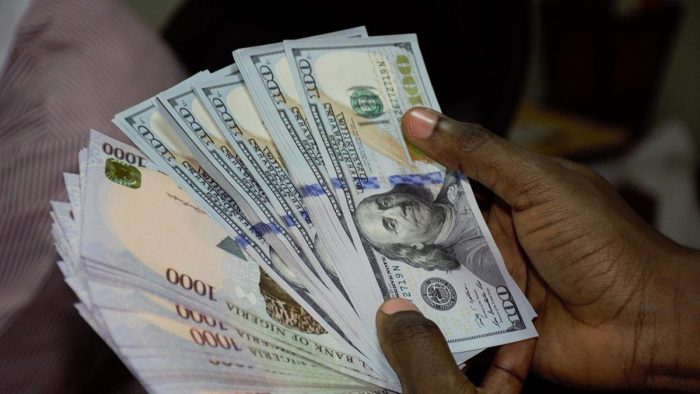Remittances and other inflows have risen over the past year, contributing to an increase in Nigeria’s foreign currency reserves, also known as external reserves. However, despite this boost, the naira continues to lose its value against the dollar.
West Africa’s largest economy recorded $553 million in remittances in one year, between July 2023 and July 2024, according to the Central Bank of Nigeria (CBN).
Other inflows that entered the country’s economy within the period include a $3.3 billion AfreximBank oil facility and $2.25 billion from the World Bank Group.
During the same period, Nigeria’s external reserves, which give the apex bank the firepower to defend the naira increased by 8.36 per cent.
The data obtained from the CBN’s website showed that the foreign currency reserves rose to $36.79 billion as of July 31, 2024, from $33.95 billion recorded on July 28, 2023.
At the Nigerian Autonomous Foreign Exchange Market (NAFEM), the naira lost 50.80 per cent of its value against the dollar during the period under review.
Data compiled from the FMDQ Securities Exchange Limited showed that the naira/dollar exchange rate quoted at N1,608.73 as of July 31, 2024, compared to N791.42 quoted in the corresponding period of 2023.
On the parallel market, popularly called the black market, the naira traded at N1,610 as of July 31, 2024, losing 46.15 per cent of its value against the dollar, which traded at N867 on July 26, 2023, data compiled from the online exchange rate collating platforms and street traders revealed.
Nigeria’s currency and interest rate dynamics are attracting international investors, but the inflows remain modest compared to Egypt, according to Charlie Robertson, Head of Macro Strategy at FIM Partners UK Ltd.
Robertson, speaking to BusinessDay in July 2024, acknowledged that while Nigeria’s currency is widely regarded as undervalued and its high interest rates appealing, only a few billion dollars have flowed into the country. In contrast, Egypt has attracted over $20 billion in foreign investments.
Robertson attributed this disparity to several factors. In Egypt, interest rates are almost on par with inflation, creating a more stable investment environment. Additionally, Egypt’s substantial support package from the International Monetary Fund (IMF) has significantly reduced its borrowing costs, a financial cushion Nigeria lacks as it navigates its economic adjustments independently.
“The Gulf’s support to Egypt has further boosted investor confidence, providing a layer of reassurance that Nigeria has yet to achieve,” Robertson noted.
Nigeria’s approach, focused on improving its trade balance without external financial aid, could stabilize or even strengthen the naira in the long term. Robertson suggested that if Nigeria succeeds, it might see a surge in both foreign and local investments, potentially attracting billions more into the country. However, until then, Egypt remains the more favoured destination for international investors.
Net foreign exchange flows rose to $25.4 billion between January and June, marking a 55 per cent year-over-year increase, according to the CBN.
This growth has been driven by a rise in capital importation, which reached $6 billion in June 2024, and record inflows from diaspora remittances through formal channels.
Net foreign exchange inflows refer to the total amount of foreign currency entering a country minus the total amount of foreign currency leaving the country over a specific period.
Responding to the impact of the inflows on the naira, Ayokunle Olubunmi, head of Financial Institutions Ratings at Agusto Consulting, said things would have been worse without the inflows considering that oil production was low and below OPEC quarter.
Olayemi Cardoso, governor of the CBN, speaking in February 2024, explained that the exchange rate pressure is largely driven by two key factors: a reduction in the availability of U.S. dollars and an increase in demand, particularly for education, healthcare, and personal travel abroad.
Over the past decade, Nigeria has seen a substantial rise in the number of students pursuing education overseas, with foreign exchange demand for education and healthcare totalling nearly $40 billion during this period. The growing outflow of dollars is further exacerbated by Nigerians seeking Personal Travel Allowances (PTA), which have accounted for $58.7 billion over the same period.
Highlighting the scale of demand, Cardoso noted that between January and September 2019 alone, the CBN disbursed $9.01 billion for personal foreign travel, underscoring the significant strain on the country’s foreign reserves.
The Central Bank of Nigeria resumed retail dollar sales through the retail Dutch auction system and has sold over $1.7 billion in two auction days.
At present, the naira/dollar exchange rate is approximately N1,490 to N1,590 on the official FX market, while on the black market, it ranges from N1,597 to N1,620. Following the Central Bank of Nigeria’s reintroduction of the retail Dutch auction system in the foreign exchange market, external reserves have experienced a slight decline of 1.16 per cent, or $430 million, over the past two weeks.
Analysts at Financial Derivatives Company (FDC), said due to fluctuations and CBN policy interventions and guidelines, the naira is expected to appreciate further.
According to Nigeria’s banking sector regulator, Diaspora remittances are a crucial source of foreign exchange for Nigeria, supplementing both foreign direct investment and portfolio investments. The CBN’s initiatives have supported continued growth in these inflows, aligning with the institution’s objective of doubling formal remittance receipts within a year.
“The increase in remittances is a strong testament to the success of the CBN’s ongoing efforts to bolster public confidence in the foreign exchange market, strengthen a robust and inclusive banking system, and promote price stability, which is essential for sustained economic growth”, Hakama Sidi Ali, acting director, corporate communications. Said in a recent statement.
Join BusinessDay whatsapp Channel, to stay up to date
Open In Whatsapp





